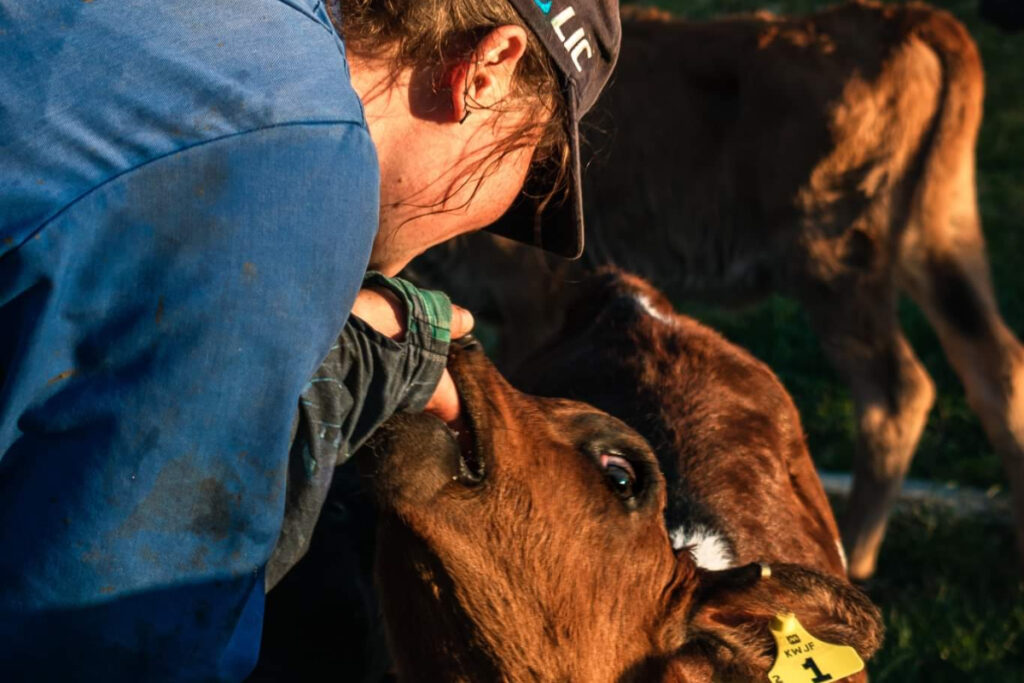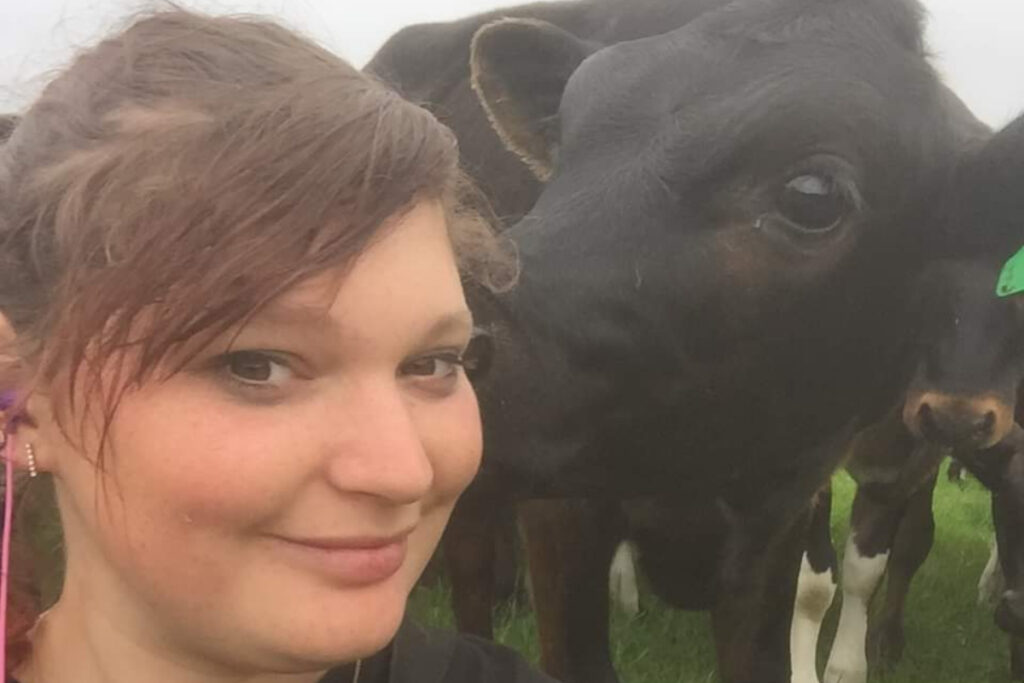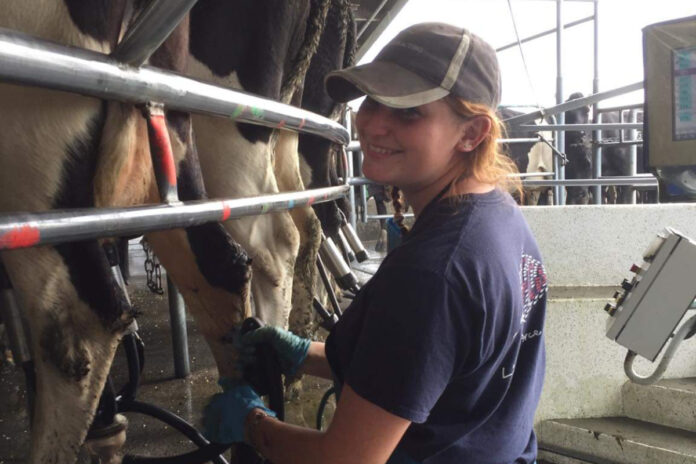That’s Farming editor, Catherina Cunnane, in conversation with Florine Demely, (27) in this week’s women in ag segment. We discuss her suckler farming roots, a stint in New Zealand, moving to Ireland, her position as a FRS operator on a dairy farm in Offaly, and a newfound passion for sheep.
“I grew up on a small suckler farm in Ardennes, North-East France, and my parents used to work as contractors as the farm is too small to make a living out of it.
Before my dad started the sucklers, my grandparents had a small dairy herd, but they sold it before I was born.
A few years back, before the Covid pandemic struck, I wanted to turn my hand to Irish farming, but as Covid hit, I stayed in New Zealand, where I was since 2016.
The main motivation was that the dairy system is like the kiwi one, but I could be closer to my family.

Farm operator in Offaly
I found FRS Farm Relief online. On the website, there were lots of different positions. I found a job that met my requirements. So, I applied and got a Zoom interview, and I was then set; it was an easy process.
I arrived in Ireland at the end of January 2022 for the start of the calving season. I am currently living in Bracknagh, Co. Offaly, and working for FRS Farm Relief as an operator.
The farm is a mixed enterprise of 320-acres. It used to be a suckler farm with a small dairy herd before that. When Doug took over, it was only sucklers then, and he introduced sheep.
Five years ago, he took on the challenge to start dairy farming. He then bought his first dairy heifers and reared them on the farm until their first calving last year, alongside building the new milking parlour, a 20-unit swing over.
Today, there are 170 dairy cows and 40 suckler cows, and they rear all the young stock to beef.
Furthermore, the enterprise comprises some 220 ewes that lamb in April, so there is a little break between full-time calving and full-time lambing.
My responsibilities are varied, from milking to bedding, feeding, and general maintenance. This year, I got to take on calf rearing, as in New Zealand, there was always a full-time calf rearer, so it was nice to spend more time with the calves, which I enjoyed.
Although, I must admit that it can be challenging to teach newborns to drink from the bottle at first.
During lambing, I did check-ups during the day and assisted the troubled ewes at times. I learned a lot about sheep but overall, lambing a ewe is not much harder than calving a cow.
My main reason for choosing this farm was the sheep, as it was all new to me, and I was not disappointed by it. I love it, and it is amazing to see the lambs grow quickly.
Typical working day
At this time of the year, a typical day starts with feeding calves while my boss is milking. Then, I go help wash out the parlour with him.
After breakfast, it is time to check up on the mating cows in the field, check on the sheep that are now out in the field, and feed the herd of triplets.
The afternoon jobs are different every day. The last few weeks, we have been dosing cattle, and bedding calves took most of the afternoons as well, etc.
The days are always busy, and before you know it, it is time to feed the few calves still on twice-a-day feeding, and then it is milking time again.
What I like the most is probably checking on the stock, making sure they are ok, where they are supposed to be and watching them grow. I like the diversity on this farm; not one day is the same, and it is really enjoyable this way.
I do not think I find anything challenging at this point. I am lucky to work in a stress-free environment. That has not always been the case for me, so I am enjoying every day.

Career highlight
My career highlight to date has probably been the move I made to come back to Europe. This type of family farming where the whole family is involved is what I am looking for.
I enjoyed the big team and large numbers of cows back then in New Zealand), but it did not fit with the lifestyle I wanted to have. Also, working with sheep is definitely something I want to keep doing.
I do not think I would change anything in my career. Even though it had been tough sometimes, I have always learned a lot from it. The main lesson I learned is that without people, there is no farm.
Making sure all staff members are happy will allow them to be in a good place to take care of sensitive animals as cows that can sense stress.
Education
I have a degree in crop farming, which I completed back in France. My dad used to tell me I would be in a better place in that area.
However, I should not have listened to him and maybe have studied animal science instead, as animals have always been my passion.
After this, I completed a bachelor in agri-business that I did part-time working for a farm supply business.
This was a big turning point in my life because I hated going on farms trying to sell things to farmers that were already struggling financially.
That is when the opportunity to travel to New Zealand came up, and I found myself happily working on the farm.
Growing up, I used to think that farming was not an option for me as a girl, and also, as the family farm was too small to make a living out of it.

Future
I am planning to go back to New Zealand in September for a lambing season as it will be a different lambing experience outside and in the hills.
Then I plan to come back to Ireland and maybe find a managerial position on a small dairy farm.
But I am open to any opportunity that might come up for me; I am going to keep my options open.
In a few years, I would like to become an AI technician, but I would like to start small may be on my own herd, before I get started in a commercial way.
Advice
I would advise anyone, but especially females, that anyone can do it as long as they want and enjoy doing it. It can still be physical, but there are many ways to manage it.
Work smarter, not harder, is one thing I always remember. Also, for people who do not have a farming background, it can seem scary as there is so much knowledge about all the different farming areas, but there is nothing you cannot learn.
The main thing is to find someone willing to trust you and teach you. You will make mistakes, we all did and still do, but that is how you learn.
For new people in the industry, I would say do not hesitate to ask questions – there are no stupid ones. Try to find a sort of mentor; this can be someone you work for/with, can be a friend or a family member.
Being in stressful situations will happen and if you do not know where to start, call someone with experience; they might give you the little reassurance you need.
What it takes to succeed is a passion for it. Having an understanding of nature, and stock, being practical, and trying to be a step ahead when you can.
It can be simple things like having calf pens ready – small things can become big things in busy times.
Also, take care of yourself; if you do not do it, you will not be able to take care of your stock.
Put yourself first (it is easy to say, I know), but there is always the option to employ someone to do some relief work like from FRS Farm Relief. You do not have to do it all yourself; reach out for help.
Future
The future of agriculture in Ireland, like everywhere else in the world, we will have to take care of our land to keep it fertile and healthy.
We will have to be open to new practices, or some ancient ones, to keep healthy life in our soils. Worms are as important as cows. No worm, no grass; no grass, no cows.
The challenge is to work together to keep sustainable farming, producing healthy food for everyone.
Education is really important. I have been lucky to encounter amazing people that taught me more than just how to do things; they taught me, more importantly, to think by myself.
Take on all the advice you can, but keep in mind that no two farms are the same.
What may be working for your neighbour might not work for you. Be open-minded. When having conversations with other farmers, listen to them even if you do not agree.
Try to see the bigger picture of their systems; you will always gain from it.
FRS is currently hiring farm staff. To find out more by calling 0818 890 890 or visit this page for current vacancies and to apply online.





